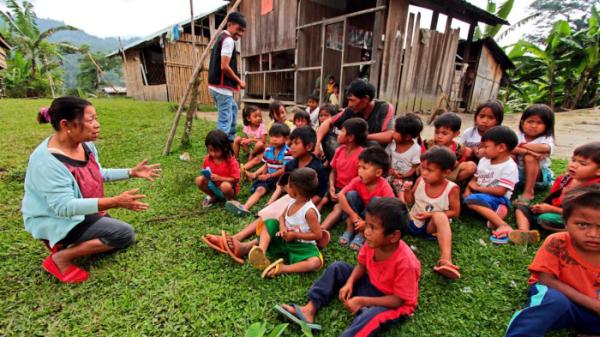
Teacher Anita Castillon helps educate T’Boli children in Lake Sebu. (CONTRIBUTED PHOTO)
Up in the mountains of Lake Sebu of South Cotabato, a 62-year-old widow lovingly tends and nurtures T’Boli families to help them grow into self-reliant communities.
Anita Castillon, or “Nanay Anit” to many, is a small woman with a colossal love for her work as educator in remote rural villages in Mindanao.
After her husband’s death, this native of Antique province focused on raising her only daughter and teaching.
Living in Lake Sebu since 1979 and working at the Sta. Cruz Mission, she grew to love the T’Boli children, whose families struggle with poverty.
She established the Marmylone Learning Center across her home as well as three indigenous learning schools in two mountain barangays in Lake Sebu.
Her garden is bigger than her house. A gazebo stands by the gate of her well-planted yard. School armchairs, many of them damaged, are arranged there. This is where meetings with the parents take place, she said.
“Nanay Anit sacrificed a lot by being far from her only daughter so she could serve the far-flung communities,” said Remy Unggol, a municipal councilor and a T’Boli.
Now that her daughter is in the USA, Nanay Anit’s days are mostly spent with the T’Boli tribe.
Knowing how tight finances are (It costs a family P50 a month to send a child to school), she asks them to pay P20 a month and grow a garden, so its yield can be used for the school’s feeding program.
This allows T’Boli parents to afford sending their children to school.
Castillon, who has 17 years of teaching experience, teamed up with the municipal nutrition officer, Magdalena Padilla, to develop a feeding program that drastically cut down malnutrition among the children.
“You can see the people’s need when you approach them,” Padilla said, adding that Nanay Anit finds ways to address these gaps.
Residents had the habit of helping themselves to vegetables and fruits from their neighbor’s garden.
Today each family tends its own garden for its own consumption and to support the school’s feeding programs for pupils. Families also assist in cooking the day’s meals.
GETTING THERE
To reach the mountain villages, only a big truck or a skilled habal-habal driver can navigate muddy and bumpy dirt roads.
When no ride is available, Nanay Anit goes on foot to reach the villages.
Sometimes she asks for security from the Army to reach far-flung areas like barangays Takunel and Tasiman.
An army officer said he admired her grit.
“It is our responsibility to visit the farthest communities and ensure their safety. But Nanay Anit, a civilian and not even a pure T’Boli herself, goes the extra mile for service,” said Lt. Col Abel Porto, commanding officer of the 27th Infantry Battalion, Charlie Company.
Sometimes Nanay Anit is mistaken for either an insurgent or looked with suspicion as an intruder. With their semi-nomadic ways, T’Bolis don’t easily trust lowlanders. After all, a big part of the land is now owned by non-tribesmen.
However, Nanay Anit continued with her work and gained their trust.
“Letting the people understand is hard. You have to level with them. She comes here every week. Before, the people were just afraid,” said Roberto Bulol, a T’Boli residing in sitio Batutunggal which has around 30 families.
After tribesmen saw Anit as their ally, they offered their help.
In barangay T’Noos, the local men used their carabaos and horses to carry the sand and gravel for building the modest school. In barangay Takunel, volunteer teachers like Grade 1 teacher Dunissa Anggol, are sheltered by local families near the school.
Surviving the modern world
Nanay Anit worries about the future of the T’Bolis as more outsiders take interest in the land surrounding Lake Sebu. Many of the original setters have had to leave their land and head for the mountains. The distance takes them away from the rural centers and access to schools and basic services.
To prepare the tribe and their children for other sources of income, Nanay Anit introduced programs for them to learn new skills to help them “survive the modern world,” she said.
Through the ILS, she introduced brass casting and abaca planting as a livelihood program as a means to be more self-reliant.
Home for this school teacher is a semi-concrete house with two small rooms on a small hill. It has a porch and overlooks a big garden.
“Many people have ignored the IPs (Indigenous People),” she said, shedding a few tears.
Living and working alongside them gives her purpose and a deep sense of joy. She explained: “I cry because I’m happy.”
It’s just like working on the land that is the heart and head of the T’Bolis. What she’s doing is just like cultivating the garden below her hut, she has to go down, dig the earth, water the plants, and wait for them to bloom.
And when they do, her heart blossoms with happiness.
(Anita Castillon is one of three finalists in the individual category of the 6th RAFI Triennial Awards. The winners will be known Friday, August 14.)